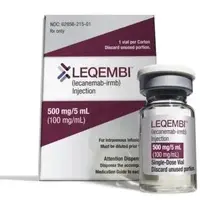Common Leqembi side effects include
- infusion-related reactions,
- headache,
- swelling in areas of the brain, with or without small spots of bleeding in or on the surface of the brain (ARIA).
Leqembi can cause serious side effects
Allergic reactions Get emergency medical help if you have signs of an allergic reaction: hives; difficult breathing; swelling of your face, lips, tongue, or throat.
Amyloid Related Imaging Abnormalities or “ARIA” See Warnings below.
Infusion-related reactions may occur during the injection. Tell your medical caregiver immediately if during your infusion you feel dizzy, nauseated, light-headed, itchy, sweaty, or have a headache, flu-like symptoms, fever, or vomiting; chest tightness, fast/slow heartbeats or pounding heartbeats, back pain, trouble breathing, or have swelling in your face.
This is not all the possible side effects. For more information, ask your healthcare provider or pharmacist, or click on the link below for more detailed information on side effects. Call your doctor for medical advice about side effects. You may report side effects to FDA at 1-800-FDA-1088.
See more: Leqembi Side Effects





